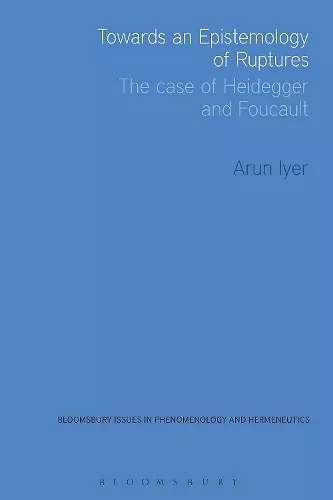Towards an Epistemology of Ruptures
The Case of Heidegger and Foucault
Format:Paperback
Publisher:Bloomsbury Publishing PLC
Published:30th Jul '15
Currently unavailable, and unfortunately no date known when it will be back

This book argues that Heidegger and Foucault provide the foundations for a new theory of knowledge by significantly expanding the concepts of knowledge and thought.
By systematically uncovering and comprehensively examining the epistemological implications of Heidegger's history of being and Foucault's archaeology of discursive formations, Towards an Epistemology of Ruptures shows how Heidegger and Foucault significantly expand the notions of knowledge and thought. This is done by tracing their path-breaking responses to the question: What is the object of thought? The book shows how for both thinkers thought is not just the act by which the object is represented in an idea, and knowledge not just a state of the mind of the individual subject corresponding to the object. Each thinker, in his own way, argues that thought is a productive event in which the subject and the object gain their respective identity and knowledge is the opening up of a space in which the subject and object can encounter each other and in which true and false statements about an object become possible. They thereby lay the ground for a new conceptual framework for rethinking the very relationship between knowledge and its object.
I praise Iyer first and foremost for his clarity of style, which does not come at the expense of intellectual interest or depth. In this book Iyer moves effortlessly between Kant, Heidegger, Husserl, and Foucault in a way that is elucidating and purposeful. -- Stephen Mendelsohn, Boston College, USA * Research in Phenomenology *
Epistemology as traditionally conceived seeks to determine the nature of knowledge and justification. Its point of departure is Plato's critique of the relativism of Protagoras, who according to Plato erred by accepting Heraclitus' construal of being as becoming. Truth, knowledge, and justification must be grounded in timeless entities of some sort. Arun Iyer shows how Heidegger and Foucault reverse this Platonic argument. For them, truth, knowledge, and justification are irreducibly historical. Iyer's elaboration of their views is subtle, original, and thought-provoking. * Andrew Cutrofello, Professor of Philosophy, Loyola University Chicago, USA *
ISBN: 9781474242004
Dimensions: unknown
Weight: 331g
232 pages